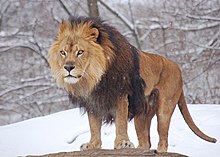lew
English
[edit]Pronunciation
[edit]Etymology 1
[edit]

From corruption of French louis, from Louis,[1] presumably Louis IX or Louis XI, who issued gold écus.
Noun
[edit]lew (plural lews or lewis or leois)
Alternative forms
[edit]Etymology 2
[edit]From Middle English lew, lewe, from Old English hlēow, hlēowe (“warm, sunny, sheltered”), from Proto-Germanic *hlewaz, *hliwjaz, *hlēwaz (“warm, lukewarm”), from Proto-Indo-European *ḱal(w)e-, *ḱlēw- (“warm, hot”). Cognate with Old Norse hlýr (“warm, mild”), ( > Danish ly (“lukewarm”)), hlær, German lau, which are themselves akin to Old Norse hlé (“lee”), Danish læ (“shelter”). Compare lee.[2]
Alternative forms
[edit]Adjective
[edit]lew (comparative lewer, superlative lewest)
Usage notes
[edit]Now chiefly Southern Scottish and Northern English.
Noun
[edit]
lew (plural lews)
- (now Scotland) Warmth, heat.
- (dialect) A shelter from the wind, particularly temporary structures raised by shepherds to protect their flocks.
Derived terms
[edit]Verb
[edit]lew (third-person singular simple present lews, present participle lewing, simple past and past participle lewed)
- (transitive) To make warm or lukewarm.
- (intransitive, obsolete) To become warm.
- (transitive) To shelter from the wind.
Etymology 3
[edit]Uncertain, but compare Old English ġelewed (“weakness, infirmity”) and limlǣweo (“limb-weak, lame”).[3] Possibly related to Proto-Germanic *laiwą (“damage”); compare Old Norse læ (“venom, bane”).
Adjective
[edit]lew (comparative more lew, superlative most lew)
Etymology 4
[edit]Interjection
[edit]lew
- (obsolete) Alternative form of lo or look: a cry to look at something.
- 15th c., “Processus Noe cum filiis [Noah and the Ark]”, in Wakefield Mystery Plays; Re-edited in George England, Alfred W. Pollard, editors, The Towneley Plays (Early English Text Society Extra Series; LXXI), London: […] Oxford University Press, 1897, →OCLC, page 38, lines 507–510:
Derived terms
[edit]Etymology 5
[edit]Verb
[edit]lew (third-person singular simple present lews, present participle lewing, simple past and past participle lewed)
- (mining, dialect, transitive) Alternative form of lue: to sift, particularly while mining tin or silver.
References
[edit]- ^ "† lew, n.¹" in the Oxford English Dictionary (1902), Oxford: Oxford University Press.
- ^ "lew, adj.¹ and n.²" and "lew, v." in the Oxford English Dictionary (1902), Oxford: Oxford University Press.
- ^ "lew, adj.²" in the Oxford English Dictionary (1902), Oxford: Oxford University Press.
- ^ "lew, int." in the Oxford English Dictionary (1902), Oxford: Oxford University Press.
- ^ "lue | lew, v." in the Oxford English Dictionary (1903), Oxford: Oxford University Press.
- Noah Webster (1828) “lew”, in An American Dictionary of the English Language: […], volume II (J–Z), New York, N.Y.: […] S. Converse; printed by Hezekiah Howe […], →OCLC.
- “lew”, in Webster’s Revised Unabridged Dictionary, Springfield, Mass.: G. & C. Merriam, 1913, →OCLC.
Anagrams
[edit]Cornish
[edit]Etymology
[edit]From Proto-Brythonic *llew, from Latin leō.
Pronunciation
[edit]- (Revived Middle Cornish) IPA(key): [lɛˑʊ]
- (Revived Late Cornish) IPA(key): [leˑʊ]
Noun
[edit]lew m (plural lewyon)
Gothic
[edit]Romanization
[edit]lēw
- Romanization of 𐌻𐌴𐍅
Kashubian
[edit]
Etymology
[edit]Inherited from Proto-Slavic *lьvъ.
Pronunciation
[edit]Noun
[edit]lew m animal (female equivalent lwica or lewka or lewina, diminutive lewk)
References
[edit]- Eùgeniusz Gòłąbk (2011) “lew”, in Słownik Polsko-Kaszubski / Słowôrz Pòlskò-Kaszëbsczi[1]
- “lew”, in Internetowi Słowôrz Kaszëbsczégò Jãzëka [Internet Dictionary of the Kashubian Language], Fundacja Kaszuby, 2022
Polish
[edit]
Pronunciation
[edit]Etymology 1
[edit]Inherited from Proto-Slavic *lьvъ, probably via a Germanic language, from Latin leō. Doublet of Leon.
Noun
[edit]lew m animal (female equivalent lwica, diminutive lewek, augmentative lwisko)
Declension
[edit]Derived terms
[edit]Etymology 2
[edit]Borrowed from Bulgarian лев (lev), from Proto-Slavic *lьvъ.
Noun
[edit]lew m animal
- lev (currency of Bulgaria)
Declension
[edit]Etymology 3
[edit]See the etymology of the corresponding lemma form.
Noun
[edit]lew f
Further reading
[edit]- lew in Wielki słownik języka polskiego, Instytut Języka Polskiego PAN
- lew in Polish dictionaries at PWN
Sranan Tongo
[edit]Etymology
[edit]Noun
[edit]lew
Welsh
[edit]Noun
[edit]lew
- Soft mutation of llew.
Mutation
[edit]| radical | soft | nasal | aspirate |
|---|---|---|---|
| llew | lew | unchanged | unchanged |
Note: Certain mutated forms of some words can never occur in standard Welsh.
All possible mutated forms are displayed for convenience.
Zazaki
[edit]
Etymology
[edit]From Proto-Indo-European *leb-, cognate with Persian لب (lab), English lip etc.
Noun
[edit]lew
- English 1-syllable words
- English terms with IPA pronunciation
- English terms with audio pronunciation
- English terms derived from French
- English lemmas
- English nouns
- English countable nouns
- English nouns with irregular plurals
- Scottish English
- English terms with obsolete senses
- English terms inherited from Middle English
- English terms derived from Middle English
- English terms inherited from Old English
- English terms derived from Old English
- English terms inherited from Proto-Germanic
- English terms derived from Proto-Germanic
- English terms derived from Proto-Indo-European
- English adjectives
- English dialectal terms
- English terms with quotations
- English verbs
- English transitive verbs
- English intransitive verbs
- English terms with unknown etymologies
- English interjections
- Middle English terms with quotations
- en:Mining
- en:Temperature
- Cornish terms inherited from Proto-Brythonic
- Cornish terms derived from Proto-Brythonic
- Cornish terms derived from Latin
- Cornish terms with IPA pronunciation
- Cornish lemmas
- Cornish nouns
- Cornish masculine nouns
- Gothic non-lemma forms
- Gothic romanizations
- Kashubian terms inherited from Proto-Slavic
- Kashubian terms derived from Proto-Slavic
- Kashubian terms with IPA pronunciation
- Rhymes:Kashubian/ɛf
- Rhymes:Kashubian/ɛf/1 syllable
- Kashubian lemmas
- Kashubian nouns
- Kashubian masculine nouns
- Kashubian animal nouns
- csb:Panthers
- Polish 1-syllable words
- Polish terms with IPA pronunciation
- Polish terms with audio pronunciation
- Rhymes:Polish/ɛf
- Rhymes:Polish/ɛf/1 syllable
- Polish terms with homophones
- Polish terms inherited from Proto-Slavic
- Polish terms derived from Proto-Slavic
- Polish terms derived from Germanic languages
- Polish terms derived from Latin
- Polish doublets
- Polish lemmas
- Polish nouns
- Polish masculine nouns
- Polish animal nouns
- pl:Heraldry
- Polish terms borrowed from Bulgarian
- Polish terms derived from Bulgarian
- Polish non-lemma forms
- Polish noun forms
- pl:Bulgaria
- pl:Currencies
- pl:Male animals
- pl:Panthers
- Sranan Tongo terms borrowed from Dutch
- Sranan Tongo terms derived from Dutch
- Sranan Tongo lemmas
- Sranan Tongo nouns
- srn:Felids
- Welsh non-lemma forms
- Welsh mutated nouns
- Welsh soft-mutation forms
- Zazaki terms derived from Proto-Indo-European
- Zazaki lemmas
- Zazaki nouns
- zza:Anatomy

